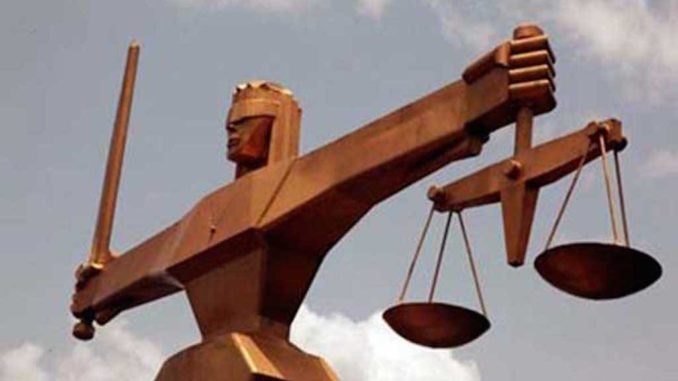
Despite the fact that Nigeria is a signatory to the United Nations Convention Against Torture and other cruel, inhuman or degrading treatment or punishment, it is strange that even some officers of the law in the country are still accessories after the fact of torture. Convention Against Torture is a treaty, which seeks to prohibit the use of torture on citizens by member States. The spirit of the Convention is duly captured in the nation’s Constitution, particularly section 34(1), and in furtherance of which the Anti-Torture Act was enacted by the National Assembly in 2017.
However, it is still a common sight on our streets to find security agents torture or subject members of the public to various degrees of degrading human treatments such as horse whipping and “frog jumping” and sundry traffic violations.
According to the United Nations Convention, and as ratified by the Anti-Torture Act, torture means any act by which severe pain or suffering, whether physical or mental is intentionally inflicted on a person for such purposes as obtaining from him or a third person information or a confession, punishing him for an act he or a third person has committed or is suspected of having committed, or intimidating or coercing him or a third person, or for any reason based on discrimination of any kind when such pain or suffering is inflicted by or at the instigation of or with the consent or acquiescence of a public official or other person acting in an official capacity.
It is a thing of shame that twenty years into our 4th democratic dispensation, and in an era of tremendous technological advancement in the area of intelligence gathering, our security agencies are still being reported as engaging in torture, a hallmark of the nightmarish military rule, which many Nigerians would rather forget in a hurry as a means of extracting information and confessions from suspects. Cases of unlawful detention without trial are reported daily, amongst which are the celebrated cases of the leader of the Islamic Movement of Nigeria, Ibrahim El-Zakzaky and the erstwhile National Security Adviser (NSA) Col. Sambo Dasuki who have been held in incarceration since 2015 in spite of various Court orders for their release. The Special Anti-Robbery Squad (SARS), a branch of the Nigeria Police force has come under intense criticism in recent times owing to its unorthodox practices, which have resulted in the deaths of many, particularly youths who are alleged to be involved in cybercrime.
In May, 2019 Nigerians were greeted with alleged cases of rape of suspected sex workers in the Federal Capital Territory, Abuja, by members of the Police force, during the recent crackdown on some strip clubs and other red lights districts.
However, while many conceive the security agencies to be the usual suspects, the irony is that a large number of incidents of inhumane and degrading treatments are daily melted out in our homes, workplaces, schools and religious institutions and are often perpetrated by parents, guardians, caregivers, employers and religious leaders. These are done either in the guise of traditional practices, religious beliefs, or parental discipline. For instance, it is a prevalent practice in some areas in the Southern part of Nigeria, to subject persons, and in most cases of children exposed to starvation, confinement and whipping as a form of exorcism, undertaken by religious leaders and or witch doctors. Many will not forget in a hurry the activities of Chukwuemeka Ezeugo, popularly known as “Rev. King” who was convicted for the murder of Ann Uzoh and the attempted murder of five others whom he had set ablaze on allegations of adultery. As absurd as it may sound similar practices still abound in most parts of the Country. Parents and guardians are also wanting of subjecting their wards to such dehumanising treatment, which often results in some form of physical deformity of the child. Sometime in 2017, Nigerian’s were shocked by the report of a lady who had locked up her 13-year-old maid, in an apartment in Lagos, while she travelled out of the country for weeks, with the child left with two packs of biscuit to feed on.
In the main, our security agencies must measure up to their international counterparts by adopting international best practices in the areas of crime investigation and prosecution. The government must play its role by providing adequate funds to ensure capacity development and equipment to enhance forensic investigation. This will prevent our security personnel from resorting to other crude form of obtaining evidence in the course of crime prosecution. Spare the rod and spoil the child it is said, but parents and guardians must realise that the rod should be employed sparingly, bearing in mind that the idea is to correct and not to mar.
As a people, we must uphold the dignity of the human person, and as provided by Anti-Torture Act, “No exceptional circumstances whatsoever, whether a state of war, internal political instability, or any other public emergency, may be invoked as a justification for torture”. We must recognise these practices as being unlawful, inhumane, and a violation of one’s right to dignity of human person, which is punishable by law even in instances where there is consent by the victim. The physical scars victims of torture are often left to their devices. Sometimes the harm done to them are indelible and most spend the rest of their lives reliving those harrowing moments as they undergo some form of psychological torture for the rest of their lives, which has its own adverse effects on the larger society.
END

Be the first to comment